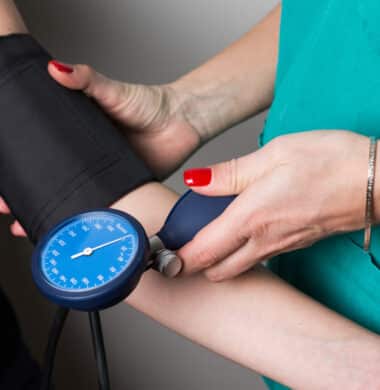6 Tips to Manage High Blood Pressure

High blood pressure is a common condition impacting Americans. According to the CDC, roughly 47% of adults in the United States have high blood pressure, and only about 24% of these people have their condition under control. When left uncontrolled, high blood pressure can increase your risk of a variety of serious heart-related conditions, including heart attack and stroke.
While medication is required in certain cases, you can often manage your high blood pressure by making certain lifestyle changes. The following tips will help you keep the condition under control, minimizing your risk of developing other serious health issues down the road.
Monitor Your Blood Pressure Regularly
High blood pressure is often referred to as a “silent killer” because it quietly damages your blood vessels without the development of any real symptoms. This lack of symptoms makes it hard to understand if there are any significant changes in your condition without regular monitoring of your numbers.
Checking your blood pressure +on a regular basis will help you detect patterns in your condition and alert you to changes as they develop. It will also help you determine whether the other lifestyle changes you’ve made have been successful. The American Heart Association has designed a printable blood pressure log (PDF). We recommend that you use this to record your numbers so that you can more effectively manage your condition.
Exercise Regularly

- Brisk walking
- Jogging
- Swimming
- Cycling
- High-intensity interval training
The key to making cardio exercise a regular part of your routine is to choose something you enjoy doing. This will make it easier to commit to a routine and provide the motivation you need to stick with it.
Eat a Healthy Diet
Your diet plays an important role in managing high blood pressure. Make sure to eat foods rich in the following nutrients:
- Potassium (at least 4,700 mg per day)
- Magnesium (at least 500 mg per day)
- Calcium (at least 1,200 mg per day)
Adopting the Mediterranean diet is good for your blood pressure. The other dietary plan that is highly recommended is called DASH (Dietary Approaches to Stop Hypertension). It involves eating a diet containing lots of:
- Fruits and vegetables, especially berries
- Whole grains
- High-protein foods, such as unsalted nuts
- Leafy greens
- Beans
- Low-sugar yogurt
- Soy protein (in place of animal protein)
- Dark chocolate
In addition, limit your consumption of:
- Foods high in saturated fat
- Processed foods
- Sugar
- Salt
- Carbohydrates
- Caffeine
Lose Weight
–
- Get your body mass index (BMI) between 18.5 and 24.9
- Lose belly fat (carrying too much weight around the waistline increases your risk of high blood pressure
In addition, weight loss can help improve sleep apnea, a condition that can elevate your blood pressure and increase your risk of an irregular heartbeat.
Reduce Stress
We all experience stress on occasion. Brief stressful moments may cause a temporary spike in blood pressure that will usually return to normal once the stressful situation is resolved. However, chronic stress can have a more serious impact on your health and increase your risk of high blood pressure. Therefore, actively working to reduce the stress in your life can make a positive impact on your blood pressure.
The following tips can help you manage stress in your daily life:
- Exercise regularly
- Get a good night’s sleep
- Get a pet
- Try yoga or meditation
- Listen to calming music
- Try relaxation breathing
- Make time to relax
- Avoid stress triggers
Reduce Alcohol Consumption and Quit Smoking
Many common vices contribute to high blood pressure. The two vices to be most careful about are alcohol and smoking.
Excessive alcohol consumption can contribute to high blood pressure. Therefore, make a conscious effort to limit alcohol consumption to no more than one drink a day for women and no more than two drinks a day for men.
Smoking increases your risk of many serious health issues, including high blood pressure and heart disease. Quitting smoking is one of the best things you can do to take control of your health, and it will help lower your blood pressure.
South Denver Cardiology Associates Can Help You Manage Your High Blood Pressure
At South Denver Cardiology Associates, we’re committed to helping you maintain optimal heart health. This includes providing comprehensive services to help you manage your high blood pressure. Our Pulmonary Hypertension Center is your go-to resource as you try to lower your blood pressure. It provides treatments and therapies to address your condition.
In addition, we offer nutritional counseling to help you lose weight and eat a heart-healthy diet. You can also come to our medical fitness gym to get on an exercise program designed to help you manage your high blood pressure.
Contact us today to schedule an appointment.
- Does Vaping Increase Your Risk of Heart Disease? - July 7, 2025
- Lifestyle Factors That Increase Your Risk of Heart Disease - May 26, 2025
- 6 Tips for Exercising Outdoors with a Heart Condition - May 19, 2025
Sign Up
As with any health concerns, your specific treatment program should be discussed thoroughly with your primary care physician as well as any specialists who may need to be consulted – like a cardiologist.
Sign Up
